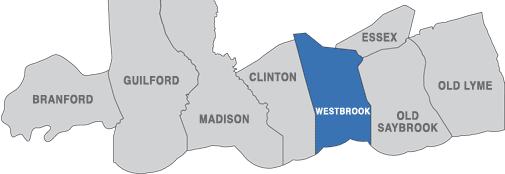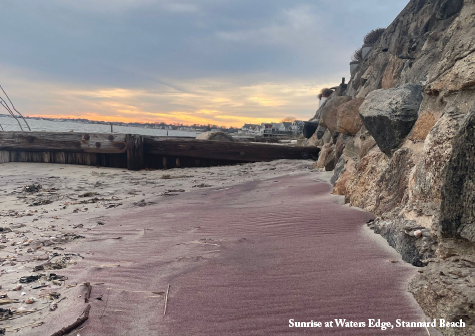Settled by homesteaders from the Old Saybrook Colony in 1648, Westbrook was first named Patchogue (which means at the confluence of two rivers — the two rivers being the Patchogue and the Menunketesuck) and incorporated in 1724 as Third or West Parish. Renamed Westbrook in 1810, its incorporation as the town of Westbrook took place in 1840.
During his final year of studies at Yale College, Bushnell invented a submersible craft and returned to Old Saybrook to test it. Seems The American Turtle, as it was known — a hand-powered one-man ship made of wood and steel that submerged when her ballast tanks were filled with water — showed promise, because she was pressed into service as a wartime vessel in 1776 during the Revolutionary War and actually used in combat. However, a failed attempt to attach a torpedo mine to the hull of the British man-of-war Eagle was soon followed by the sinking of the ship transporting the American Turtle, sending her to the bottom. The loss of Bushnell’s submersible notwithstanding, Westbrook has become well known as a safe haven for both recreational vessels and a small fleet of fishing boats. As a result, traffic at its marinas is heavy on summer weekends, as everything from kayaks and daysailers to row boats and yachts weigh anchor to negotiate the shallows of its rivers and the shoals and sandbars of the Sound. And also as a result, Westbrook has made sure that it has much to offer visitors and residents alike. Several B&Bs — including the Captain Stannard House, Talcott House, and the Westbrook Inn, along with its new sister hostelry at the Bushnell House Inn — welcome guests who prefer a personal touch and very reasonable prices. Some go a step further, taking advantage of the “elopement” packages offered by both the Captain Stannard House and the Westbrook Inn. The Water’s Edge Resort & Spa, just off the Boston Post Road, overlooks the Sound and offers a seaside experience rounded out with spa services, pools, tennis, and a restaurant and grand ballroom, as well as The Shops at Water’s Edge, which feature intriguing goods from local crafters and far-flung artisans. For travelers with a deep affinity for the treasures of the natural world, a walk through the Stewart B. McKinney National Wildlife Refuge may be just the thing. Its 225-acre Salt Meadow offers more than two miles of delightful trails through a tidal salt marsh, shrubland, and open fields. In the protected areas of the marshlands, shorebirds and migratory osprey nest peacefully. Hungry? Westbrook has some great places to eat. There’s Bill’s Seafood — a landmark restaurant located between Rt. 1 and the Patchogue River in Westbrook, right next to the famous singing bridge. Café Routier cultivates a world of its own in a vintage home on the Boston Post Road. Lenny & Joe’s Fish Tale has become a Westbrook favorite. And if you want to pick something up for dinner aboard or a picnic at the beach, head for Edd’s Place, also on the Boston Post Road. Jennifer Cardinal Photo |












































